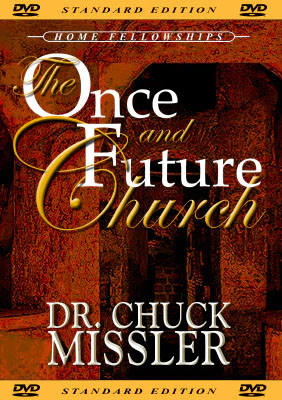Over the many decades that I have enjoyed my love affair with the Bible, I have had the marvelous benefit of many great teachers. I’ve also had the incredible experience of fellowshipping in one of the most famous churches emphasizing expositional teaching from the Word of God.
But I also would like to let you in on a precious secret. Unquestionably, the greatest personal growth I’ve ever witnessed occurs in the home Bible study. From those early years on Harbor Island Road in Newport Beach, to those precious times on Mountain Home Road in Silicon Valley, the fellowship of those intimate home groups, where people can interact, ask questions, and hold one another accountable, was the place of growth for all of us — teacher and student.
This was, of course, the way it all started. A group of but a dozen — fishermen and others — along a seaside in Galilee. Even later as Paul traveled and planted, it was the intimacy of home fellowships that provided the earliest forums for the Gospel. The declarations in the synagogues and on Mars Hill were but an initiation. Their resulting questions were responded to in small groups in homes and on hillsides.
Groups meeting in houses were the original recipients of the Gospel.1 Even the famed giving of the Spirit at Pentecost was in a house.2 Clearly, the early Christians met in homes. (Check out Acts 2:46; 5:42; 8:3; 9:11; 12:12; 16:40; 18:7; 20:20; 21:8; Rom 16:5; 1 Cor 16:19; Col 4:15;
1 Tim 5:13–14; and Phile 1:2).3
(When you visit the remains of Peter’s home in Capernaum, you can trace the gradual additions in its transitions from a modest home to a larger meeting place. There now exists a modern structure suspended over the original ruins so as to not disturb the archaeological site.)
As I traveled, both in the United States and especially abroad, I sensed that the emergence of home fellowship groups was, again, one of the most exciting — and spiritually productive — phenomena on the planet Earth.
Controversial
These groups take many forms and styles. Some are healthy, intimate fellowships to be encouraged. Some are sponsored and supervised by a local church. (I use the term here in the vernacular sense: actually, the “churches” are meeting in the homes! An elder once reported to his pastor, “They are chewing gum in the sanctuary!” The pastor corrected him, “No, the sanctuaries are chewing gum!”)
In other cases, the gatherings are a response to a lack of teaching, or other opportunities to participate. They can be a symptom of a shortfall in opportunities of various kinds. In many cases they are, tragically, a form of rebellion or rejection of traditional styles of “church.”
Cozy
There are, obviously, many that find the excitement of a “Mega-Church” environment irresistible. The quality of the music and other accoutrements can be very uplifting, and the exposure to a nationally recognized leadership can be truly inspiring.
There are others, however, who find the mere size of such an organization intimidating and seek a more personal opportunity to participate and grow in. Many of the larger organizations also foster and nurture small groups (often called “cells”) during the week to respond to just
such needs.
Some pastors tend to discourage the formation of home study groups for a variety of reasons, some valid and some questionable. But like it or not, it is unquestionably the tide of the times. It was the principal phenomenon of the first century and it appears to be one in the 21st century as well!
Contrast of Resources
Of course, the early church was constrained geographically by the limitations of foot travel, and also by the lack of printed materials. We generally fail to fully appreciate the role Gutenberg’s movable type played in printing technology and its role in relieving the darkness of the medieval period!
With the Internet, one can find out practically anything about anything, if they know how. The resources now available are truly astonishing, are improving daily, and can be downloaded. Whole volumes, that would fill a library, can be stored in a device that fits in the palm of your hand.
One of the many implications of our current environment — in contrast to that of the past — is that technology has favored the decentralization of information and resources, and that has remarkably improved the opportunities for “equipping the saints!”
But that still leaves the discoveries, the personal development, and the accountability to face-to-face interactions in small groups, whatever the labels or contexts.
A Challenge
If you are not presently in a small, weekly, Bible study group, I strongly encourage you to find one and give it a try. You may be in for a truly life-changing surprise. There are probably many different styles within your current orbit and one of them is likely to “fit.”
(Some are geographically within your neighborhood. Some may be groups of your professional peers. “Different strokes for different folks.”)
If you can’t find one, start one! It’s easier — and more rewarding — than you can imagine. And we are here to help you.
One way is to simply pick out a DVD (or online video on-demand) and invite a few friends and neighbors to come over for some refreshments and discussion. Play it and solicit reactions. More often than not, it will begin a series.
Or take a book of the Bible and explore it together, a chapter a week, and see what happens! God always rewards the diligent.
Or start a Small Group (as a Leader), which could utilize the Learn the Bible in 24 Hours Study Package. A package we compiled including a Leader's guide, Session Videos, Audio, Student Guides (with session questions, discussion topics), PowerPoint Slides, and more to help you get started!
Pray about it. But pray carefully: it is likely to be more life changing than you can possibly imagine.






